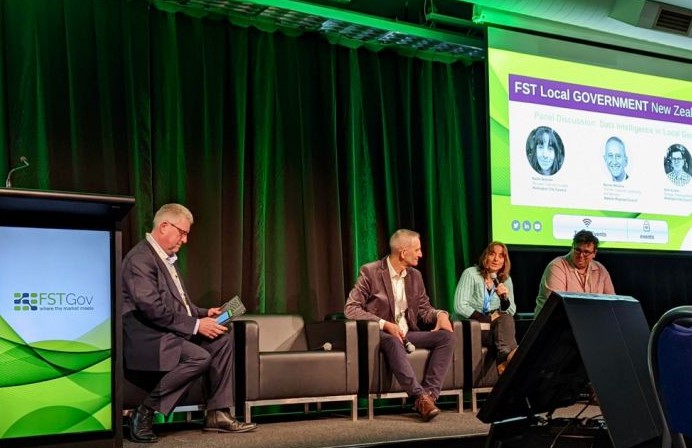
A panel of experts at the FST Local Government New Zealand 2022 conference concluded data presents opportunities for local councils to improve engagement with citizens.
Nadia Webster, manager of data and insights, Wellington City Council and Sean Audain, strategic planning manager, Wellington City Council, both worked on developing the Wellington City Digital Twin. The Wellington City Digital Twin is a virtual representation of the systems and things that make up the city. It is a 3D model brought to life through real-time data from sensors and processes to help understand, communicate and make better decisions on how Wellington works and grows.
Audin joked that he thought he was subject to a phishing attack when he received an email recognizing the work. He explained how Wellington had gained global recognition and US$1 million in prize money as one of 15 cities worldwide to win the Bloomberg Mayors Challenge.
Evidence-based decision-making is vital as a coastal city, Wellington, is highly exposed to climate change impacts. With few options for relocating infrastructure, businesses and homes, having the correct data available enables the city to plan climate adaptation decisions over the next two to three years to respond to the climate and ecological emergencies declared by Council.
“An example is the wastewater pipes”, explained Audin. “Many of our wastewater pipes sit below the forecasted sea level rise, meaning they may stop draining our wastewater, requiring extensive re-engineering.” That will be costly, so the Council needs the data models to find the right solution.
Webster emphasized that this also provides a collaboration opportunity, so engineering the data systems enables future integration. She explained how an API ecosystem can avoid the pitfalls of getting all data into a single system or repository and linking data via APIs, enabling a more flexible approach.
While the panel were discussing opportunities, the attendees were responding to a survey:
What keeps your agency from fully utilizing its’ data?
A. Technological Barriers
B. Lack of Governance Framework
- Data Quality and Accessibility
- Excessive Costs
- Lack of DataSkills
Lack of skills Digital skills was one of the highest scoring answers from attendees and a common theme for panel members. Neville Williams, director customer, community and services, Waikato District Council, highlighted organizations’ challenges in sourcing the necessary skills to enable the data ecosystem. This was not only technical skills but also around the ethical use of data.
Maintaining public trust is top of mind for all panel members and attendees. Improving availability, accessibility, and reusability allows councils to demonstrate their use of data. Through transparency, the public can gain confidence in how their data is used.
For example, panel members highlighted how they are providing data to the public via mechanisms like the Waikato data portal and the Wellington City Council Open data portal. These data portals are public platforms where the councils share data. Panel members emphasized the importance of sharing and that making data accessible and open will promote progress, unlock innovation and result in economic value through its creative use.
These sites enable the public to discover, explore and download council-owned datasets and find links to other open data websites, such as Land Information New Zealand. In addition, most data is freely available as open data.
In conclusion, the panel highlighted the need for councils to collaborate and work together to develop their skills and capabilities.





